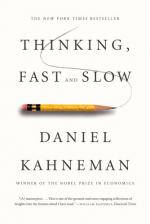
|
| Name: _________________________ | Period: ___________________ |
This test consists of 5 short answer questions, 10 short essay questions, and 1 (of 3) essay topics.
Short Answer Questions
1. What does the author claim the main function of System 1 is in Chapter 6?
2. What color are the cabs in the statistics problem presented by the author to examine statistical base rates and causal base rates?
3. The author notes that stereotyping is a negative word in our society. How does the author apply the word in his usage?
4. Who created a study article called "Becoming Famous Overnight"?
5. Who created the Cognitive Reflection Test that involves the bat-and-ball problem along with two others?
Short Essay Questions
1. Describe the Muller-Lyer illusion. What does it demonstrate?
2. What is priming and how does it relate to anchoring?
3. How is conjunction fallacy defined?
4. What does WYSIATI mean and how does the author apply it?
5. How does System 1 operate?
6. What is a heuristic?
7. What scene does the author present in order to demonstrate "norm theory" in the text?
8. What does the author demonstrate in the first two figures in Chapter 1 (the woman's face and the multiplication problem)?
9. What are the processes of System 2?
10. What is prospect theory?
Essay Topics
Write an essay for ONE of the following topics:
Essay Topic 1
Discuss the experiment on self-control conducted by Walter Mischel. What was the sample size of the experiment? Who were the subjects of the experiment? What were the conclusions reached?
Essay Topic 2
Discuss Daniel Bernoulli and his contributions to the study of decision making. What approach did Bernoulli introduce to the evaluation of gambles? Why is Bernoulli's theory flawed?
Essay Topic 3
What are frames? What are the different types of frames? How do frames affect decision making? Provide examples of frames from the text and/or from your own experiences.
|
This section contains 731 words (approx. 3 pages at 300 words per page) |

|




